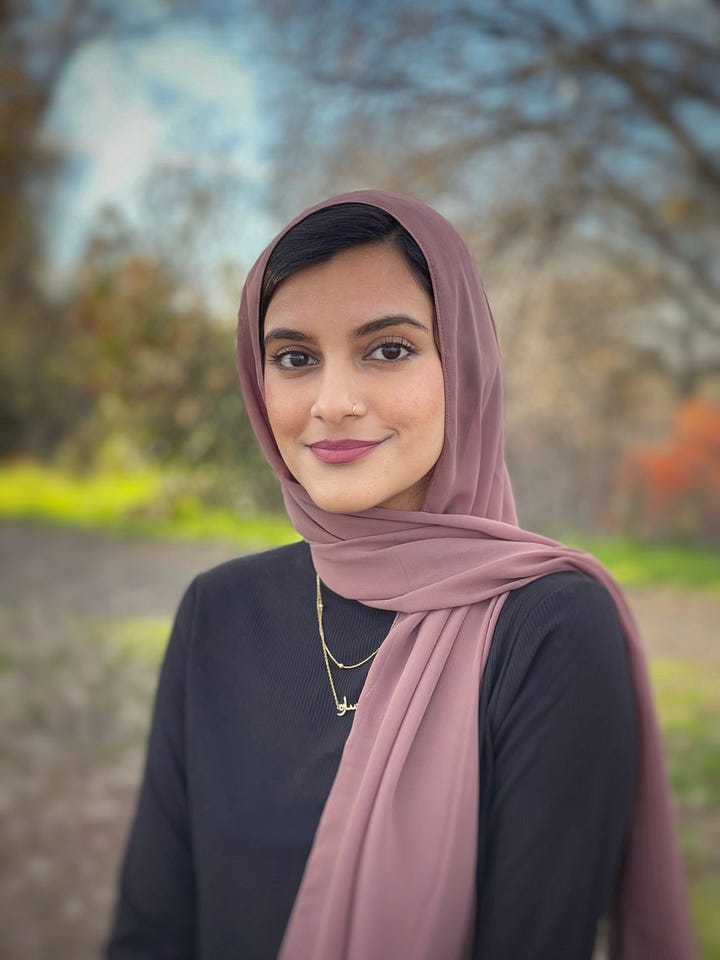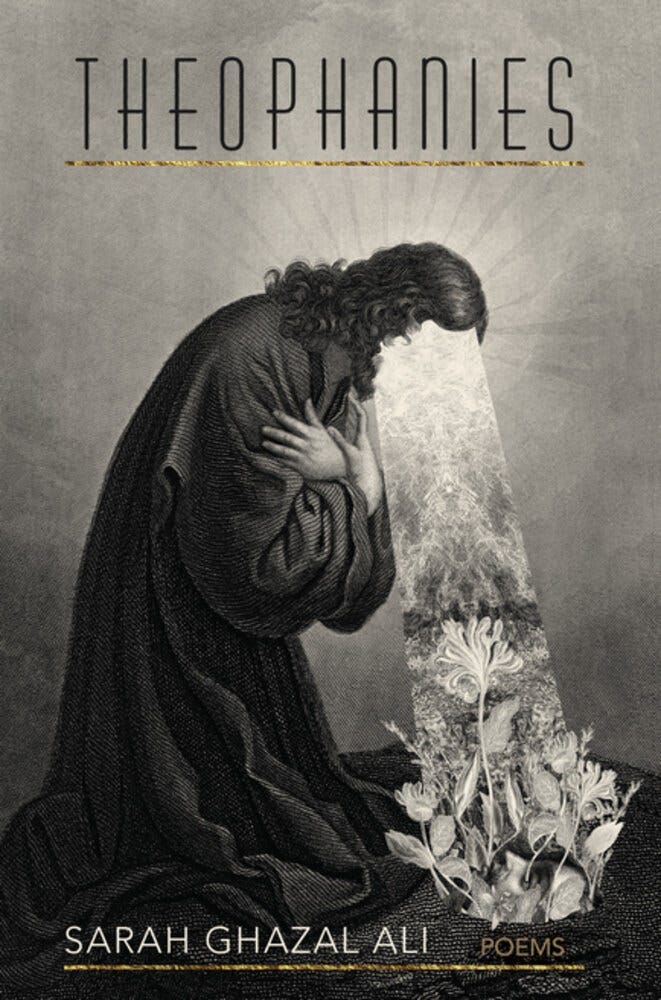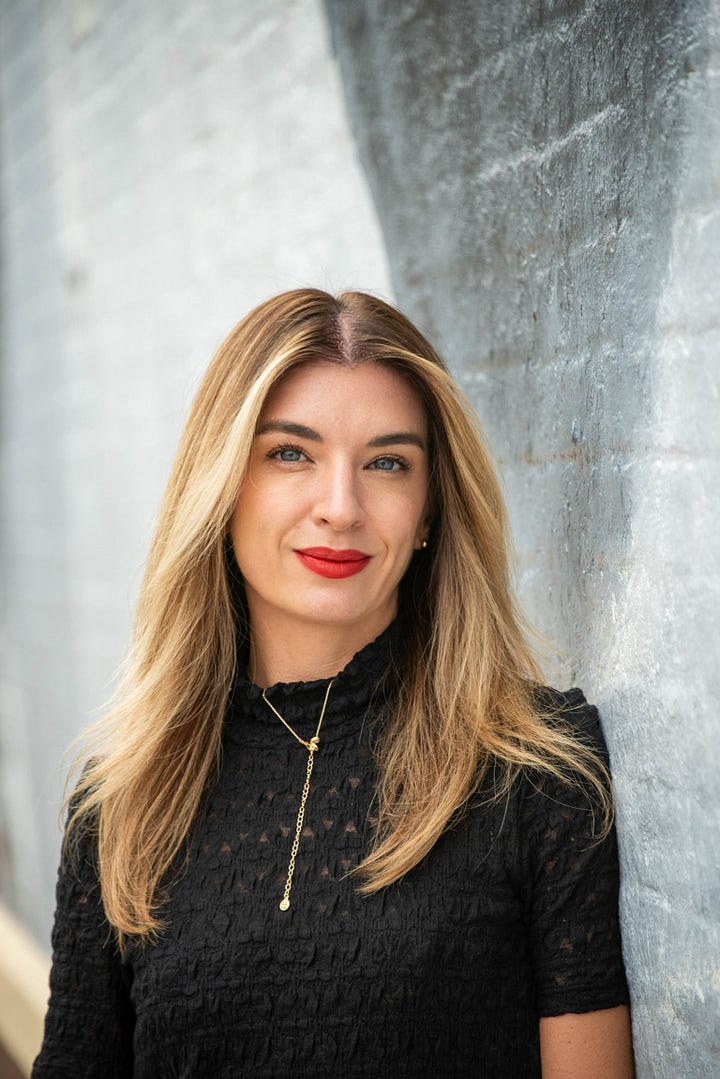Behind the book: Building a debut poetry collection
"I tried to write into my wounds." How Sarah Ali Ghazal's poem about the origin of her first name led to THEOPHANIES, which explores "the archetypal women of faith."
I love speculative poetry that reimagines and interrogates religious and cultural myths, stories, and traditions — so Sarah Ghazal Ali’s debut collection, Theophanies, was right up my alley. Take “O Gabriel,” for instance, which begins:
O umbilical mesh
apogee of angels
O ungendered & sex-
less courier
O jagged nail
fattening on His finger
O arch
& archive O bush
ablaze O throat O throat
O uterine throat
O mediary of Mary
of Musa O pillar of cloud
O brute force O being
unborn yet sent to make me
see O brilliant light
O blotting dark—
God tugs at whim your corded tongueGoosebumps, right?!! For The Frontlist, I spoke with Sarah and her editor at Alice James Books, Carey Salerno, about the highs and lows of building a debut poetry collection and examining “the mothers of sacred history.”


Sarah Ghazal Ali, author
When and how did Theophanies begin for you?
Theophanies has two origin stories. The first is that a professor in college offered a writing prompt that catalyzed an obsession with my namesake: write a poem about the origin of your name. The easy choice would have been to explore my middle name, Ghazal, which, obviously, screamed poetry. But I turned to my first name instead, and was suddenly curious about the matriarch Sarah who I was named for. That one prompt led to a near decade-long urge to write to, and into, and for the mothers of sacred history, the archetypal women of faith. That initial prompt planted a seed, but it was years before Theophanies as it is today began to take shape.
The second origin story is that Theophanies began in earnest as a different failed project. I set out during my MFA to write about a feminine paradise, one absent of men altogether. I had a lot of pent-up anger to work through and thought writing into a utopia would offer release. It didn’t — it just made the actual state of the world more bleak and unbearable.
I wrote poems that placed my mother and grandmother in lush gardens, that used a character named Nisa (the Arabic word for woman) to imagine what it might be like to exist as a woman unobserved. The poems went nowhere and did nothing, and rereading them made me cringe. I learned through trial and error that longing for a utopia was my way of turning away from what frightened or troubled me rather than facing it, rather than reckoning with it.
I tried then to write into my wounds by imagining the matriarch Sarah having similar wounds. It was a “What would Jesus do?” approach to turning my attention back to the world I inhabited, now that I think about it.
What was your writing process like?
I read scripture across faiths to absorb its cadences. I sought out Muslim poets, then spiritual poets across faiths to get a sense of how other poets have approached the unapproachable divine. Much of this book is built upon my MFA thesis, so I have to credit the structure and rigor of my MFA workshops for getting me to churn out poem after poem, week after week.
In general, I have an obsessive writing process. I can’t dash out a draft and return to it later. If I begin a poem, I have to see it all the way through, revising line by line, until I feel relatively content with it. Because I can’t walk away from an unfinished draft, this often looks like sitting at my desk for hours, the same song on repeat, until I reach the end.
My writing process is bizarre in that I revise as I go, but I don’t know what I’m revising toward, so it isn’t actually revising, it’s just following my instincts and seeing where they lead. After a poem is finished, I tend to leave it be until I feel that I have enough to begin assembling into a book. That’s when I begin really revising — revising to make poems cohere with each other.
What was the hardest thing about writing Theophanies?
The hardest thing was knowing when to stop! I struggled with the idea of the book being “done.” Were it not for deadlines, I think I might have tinkered with and reordered the poems forever. Even now, I’m struggling to feel enough distance from the book and its obsessions to turn my attention to other work, other interests, other poems.
What can you tell me about the cover?
The artwork is "Ground" by Dan Hillier, a brilliant UK artist who unfortunately just passed away on February 8th. I've been following his work for years, and was deeply grateful when he agreed to our request for "Ground" — very glad I have this cover to remember him by.


Carey Salerno, executive editor and publisher at Alice James Books
What attracted you to Sarah's manuscript?
The manuscript came to AJB through Ali submitting it for consideration to our annual Alice James Award (AJA) reading period. The editorial board, the team of poets who read and decide the AJA's outcome, was immediately enamored with and struck by the formal variation of the poems and how she addresses issues around religion, gender, and the female body confidently and clearly.
With beautiful lyricism, Ali's poems probe common constructs of society, particularly patriarchy. The poems felt undeniably incendiary to us. The structure of the book was incredibly thoughtful and eloquent. While there are many others, these are a few reasons why we chose to offer collaboration to Sarah Ghazal Ali.
What made it a great fit for Alice James?
Alice James is dedicated to publishing books that broaden our perspectives about poetry and what we consider to be the current landscape of American letters. When you read Theophanies, you understand the perspective of the poet and the reason for the poems. It's a book that uses formal variation to contribute to the book's thesis and themes, and it addresses timely subjects with a palpable sense of urgency and purpose. Theophanies is divinely true to our mission.
How did the manuscript evolve during the editing process?
Beyond some of the line editing we did, the largest development work that happened during the editing phase shored up the book's order, which was largely set already. Ali and I discussed the importance of the "Matrilineage" poems concerning the book's structure and trajectory, and we talked about the spacing, pacing, and number of these included. Ali ended up adding one more "Matrilineage" poem to the collection as a way to strengthen the importance of these poems to the book and its overall framework.
Forthcoming at The Frontlist
March book preview (and the results of my culture criticism survey)
Behind the book with Scott Alexander Howard (The Other Valley) and Rachel Lyon (Fruit of the Dead)



